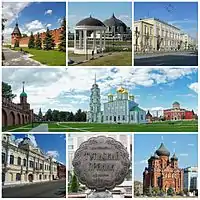Tula, Russia
Tula (Russian: Тула) is a city and the administrative center of Tula Oblast, Russia. The Klokovo air base, The Tula State University, Tula Kremlin, The Tula State Museum of Weapons and Kazanskaya part of the Upa River is located in Tula. In 2005, Tula has 465,943 people.
Tula
Тула | |
|---|---|
 | |
 Flag  Coat of arms | |
| Country | |
History
Tula was at the Upa River, which is a part of the Oka River. Tula is founded in 1146 as Taydula, Tula became the city on the southern approaches to Moscow in the 16th century and the centre of a series of defensive lines against the Tatar attack. A stone city of 1530, restored in 1784 and 1824, had survived. In 1552, Tula successfully resisted a siege by the Tatars. During the 17th century, Tula got into the major iron-working city of Russia. It was the site of Russia’s first armament factory, built in 1712 by Peter I the Great, and remains a large military staff producer. Besides iron and steel, Tula has lots of engineering industries. Brown coal is mined locally and used in the chemical industry. A highly decorated Russian tea are a traditional manufacture. Tula has mechanical, mining, and teacher-training institutes and one devoted to coal-mining research. A museum founded in 1724 displays a history of weapons. Yasnaya Polyana, the home of the Leo Tolstoy, is located 9 miles (14 km) southwest of Tula.
Geography
Tula is located 193 kilometers south of Moscow. Tula is located in the north of the Central Russian Upland in Central Russia, on the Upa River, a part of the Oka. It is 888 kilometers southeast of Saint Petersburg and 3,836 kilometers northwest of Novosibirsk.